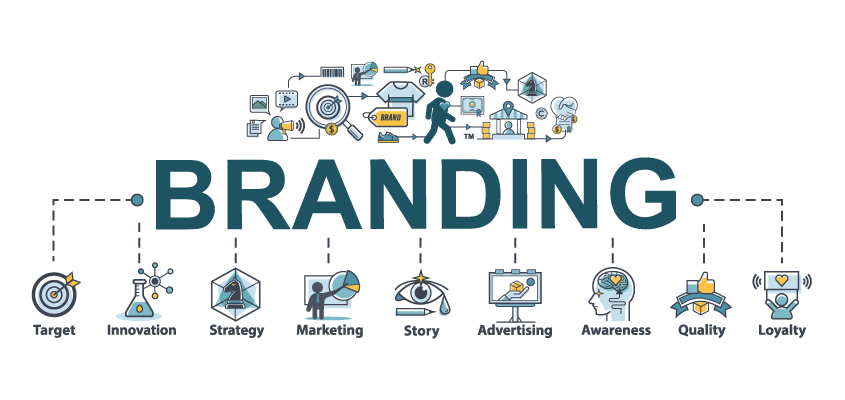Why Robust Branding Is Vital for Market Leadership
In today's competitive landscape, durable branding emerges as an essential element for attaining market management. A distinct brand name identity not just sets a company apart from its rivals yet additionally grows depend on and psychological links with consumers. These elements are important for promoting loyalty and encouraging repeat service, yet numerous companies neglect the much deeper effects of their branding approaches. As we discover the multifaceted nature of branding, it comes to be obvious that the stakes are high for those who fall short to acknowledge its importance in shaping long-term business success. What are the details approaches that can raise a brand to this esteemed status?
Understanding Brand Identification
Regularly identifying the importance of brand identity is critical for any organization desiring achieve market leadership. Brand name identity encompasses the visual elements, messaging, and general assumption that identify a firm from its rivals. It functions as a foundation for how customers communicate and view with a brand name, playing an important function fit their experiences and expectations.
A well-defined brand name identity interacts the core values and mission of an organization, developing a psychological link with its target audience. Elements such as logos, color design, typography, and intonation have to align cohesively to share a consistent message throughout all platforms. This uniformity strengthens brand name acknowledgment and cultivates client loyalty.
Moreover, brand name identification is not just shallow; it reflects the credibility and stability of a firm. It must be meticulously crafted to resonate with the intended target market while continuing to be versatile to progressing market trends. Organizations that prioritize a solid brand identity can properly distinguish themselves, develop a positive credibility, and cultivate a loyal customer base. Eventually, a robust brand identification is essential for browsing affordable landscapes and maintaining lasting success.
Structure Customer Trust
A strong brand name identification prepares for developing client count on, a vital component in attaining market management. Trust fund is not just a psychological response; it is a strategic property that can dramatically affect acquiring choices and brand name commitment. Firms that grow openness, dependability, and uniformity in their messaging and activities cultivate a complacency among customers.
To construct this trust, brand names should deliver on their pledges. This means guaranteeing that item high quality meets customer assumptions which service experiences are favorable and responsive. Additionally, constant interaction strengthens dependability; when clients know what to anticipate and that their worries will certainly be attended to, their confidence in the brand name grows.
Social proof additionally plays a crucial role in developing count on. Positive evaluations, testimonies, and endorsements from reputable sources boost a brand's track record and can sway potential clients. Engaging with consumers with social systems and addressing their concerns openly shows responsibility and commitment.
Distinction in Open Markets
In today's crowded industry, differentiation is essential for brand names seeking to stand out and catch customer focus. With numerous options offered, customers are commonly overwhelmed, making it vital for brands to establish an one-of-a-kind identity that reverberates with their target market. This differentiation can site web materialize via numerous aspects, including item attributes, rates strategies, client service, and brand messaging.
Effective differentiation includes not just determining what makes a brand one-of-a-kind but additionally connecting these differences clearly and constantly. Brands must verbalize their worth proposition in such a way that addresses certain customer needs and choices. For example, a firm might focus on sustainability, cutting-edge modern technology, or customized customer experiences to carve out a niche in an affordable landscape.
Furthermore, brand names should continually assess their affordable atmosphere to adapt and fine-tune their distinction strategies. This proactive method guarantees that they stay attractive and pertinent to consumers as market dynamics develop. Eventually, robust branding that stresses differentiation not only promotes brand name loyalty yet also places a firm as a leader in its sector, paving the way for sustained growth and market dominance.
Emotional Connections With Consumers
Emotional links function as an effective driver in building long lasting relationships in between customers and brand names. When customers resonate with a brand on a psychological level, it fosters loyalty that goes beyond plain transactional communications. Brands that successfully stimulate feelings-- whether through storytelling, shared worths, or authentic interaction-- produce a sense of belonging useful link for their clients.
These psychological ties can dramatically affect buying choices, as consumers are frequently driven by feelings as opposed to reasoning. A brand that aligns with clients' desires or addresses their discomfort points can grow a deep-rooted loyalty that leads to repeat service and favorable word-of-mouth references.
In addition, psychological branding enables business to separate themselves in crowded markets. By using the views of their target audience, brand names can carve out an one-of-a-kind identification that resonates deeply, making them memorable and preferred over competitors.
In an age where consumers are pounded with choices, a solid emotional link can be the choosing consider brand name preference. Hence, prioritizing psychological interaction is not merely an advertising and marketing technique; it is a tactical critical for brands looking for to develop significant relationships and boost customer retention.
Long-Term Business Success
Lasting company development pivots on the ability to grow robust branding strategies that reverberate with consumers in time. A strong brand name not only distinguishes a company from its competitors however likewise promotes loyalty and trust amongst customers. This lasting connection is essential for making sure repeat organization, which considerably adds to profits security and growth.
In a progressively competitive marketplace, brands that connect a clear and consistent message are more probable to thrive. This consistency strengthens brand identity, making it much easier for customers to recall and choose the brand over others. Robust Branding. Consequently, a well-established brand name can adapt to market changes without shedding its core significance, permitting technology without estranging loyal clients
Additionally, durable branding creates a system for client interaction, where services can collect responses and adjust their offerings as necessary. This iterative process not just boosts customer satisfaction however additionally constructs a neighborhood around the brand name, promoting a feeling of belonging.
Conclusion

Organizations that focus on a solid brand name identification can successfully distinguish themselves, build a favorable track record, and cultivate a devoted client base.A strong brand identification lays the groundwork from this source for developing customer trust fund, a crucial component in accomplishing market leadership. A solid brand not just separates a company from its rivals but additionally cultivates loyalty and trust amongst clients. As an outcome, a reputable brand can adapt to market changes without shedding its core essence, enabling for development without alienating loyal customers.

Comments on “Just How to Utilize Robust Branding for Sustainable Business Success”